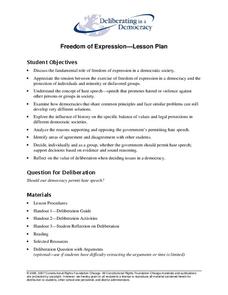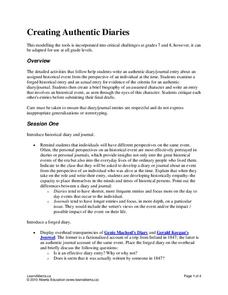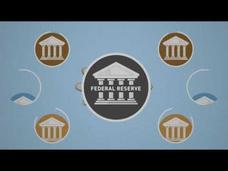Deliberating in a Democracy
Globalization and Fair Trade
Have you ever traded something? How do you know you got a good deal? Scholars use case studies and research to determine the role of globalization in fair trade. Class members examine consumer demand and competition bring to light the...
Deliberating in a Democracy
Freedom of Expression
Should democracies include hate speech as a protected right? Scholars analyze the rights found under the First Amendment to the Constitution through researching evidence. Freedom of expression becomes the focal point of the...
Deliberating in a Democracy
Crime and Punishment
Should the United States ban the death penalty? Scholars use real-life examples of criminal activity to come to their own conclusions on the death penalty. Primary source documents, as well as video clips, open the issue of capital...
PBS
1000 Words
A picture really can speak a thousand words—no matter how old! Scholars become history detectives as they learn how to analyze historical photos and evidence to uncover the past. The fun hands-on activity makes history come alive through...
PBS
WWII: Detained
Imagine being forced against your will behind barbed wire for doing nothing but being yourself. Scholars investigate the impact Japanese-American internment camps had during World War II. Through video and archival evidence, they create...
University of California
Hot Spots Research Project
The Cold War was only between the US and the USSR, right? Wrong! Scholars use primary and secondary resources to analyze the global impact of the Cold War. The fourth installment of an eight-part series culminates in the creation of a...
Facing History and Ourselves
Justice After the Holocaust
Though there could be no true justice for the horrors of the Holocaust, many of those responsible for crimes against humanity were found guilty in the eyes of the law. Using primary and secondary sources in the 16th installment of a...
University of California
Decolonization
The ripple effect from one small event can impact many others. Young historians research the ripple effect World War II had on decolonization in the second installment of an eight-part series. Through primary and secondary documents as...
Alberta Learning
Creating Authentic Diaries
Napoleon Bonaparte once said, "What is history but a fable agreed upon?" A series of lessons encourages learners to look beyond the basic fable agreed upon related to events in history and consider multiple accounts of the event. The...
Facing History and Ourselves
The Holocaust: Bystanders and Upstanders
Scholars analyze the role of bystanders during the Holocaust. The investigation explores the roles of the bystanders, upstanders, and rescuers with primary and secondary resources to determine actions taken—or not—and their implications...
Facing History and Ourselves
How Should We Remember?
We must remember the past in order to avoid its mistakes. Young historians analyze the importance of historical remembrance using primary and secondary documents, as well as video clips. They then study the creation of a World War II...
Facing History and Ourselves
Kristallnacht: Decision-Making in Times of Injustice
Have you ever been singled out in a crowd before? Pupils investigate and analyze the events of the Holocaust. They dive into the life of a middle school student, as well as the diary entries of those in Kristallnacht during World War II.
PBS
Myth of the West: Lonely But Free I’ll Be Found
Tumbling tumbleweeds! Scholars work with video clips, primary and secondary documents, and song lyrics to uncover life in the Old West. They examine song's lyrics to uncover myths told in the 1930s about life in the Wild West.
PBS
Family History: On Your Honor
What is your history? Scholars work with their own families to create a unique story of the courage and bravery of their ancestors. The third and final part of the series culminates in a creation of not just a family history, but a...
PBS
Family History: Treasure Troves
It's time for show and tell! Scholars investigate historical artifacts to determine what secrets they reveal about the time periods they represent. They then research their own personal artifacts, as well as those from World War I.
PBS
Using Primary Sources: The Rogue's Gallery
What would be in your life's scrapbook? Scholars use short video clips, primary and secondary documents, and photos to investigate a 1909 scrapbook. They analyze and uncover what the Rogue Book tells them about the past in Western...
PBS
Using Primary Sources: Nazi Spy Ring Busted
Spy games are not just for professionals anymore! Scholars use short video clips, primary documents, and photographs to investigate Nazi spies in America during World War II. The young detectives analyze the paranoia warfare can create...
PBS
Myth of the West: Kit Carson to the Rescue
There's nothing like the Wild Wild West! Scholars investigate the American Frontier through the eyes of Kit Carson. To complete the first installment of a three-part series, they use presentations, a short video, and primary and...
PBS
Family History: Those with Lofty Ideals
Would you stand up for your beliefs, no matter the cost? Scholars investigate their own families to uncover examples of how and when someone stood up for their ideals. Using video clips, interviews, and eulogies, they come to understand...
American Bar Association
What Is Separation of Powers?
Who has the power? Scholars investigate the creation of the three branches of government in the United States Constitution. They analyze just why the framers created the branches the way they did.
Bill of Rights Institute
America's Transition to a Global Economy (1960s-1990s)
Just how do we live in a global society? Scholars investigate an AP review video to see the transition in the latter half of the 20th century to a global economy. The final video of nine installments helps them examine and analyze the...
Bill of Rights Institute
Post-WWII Boom: Transition to a Consumer Economy
The war is over! Scholars investigate an AP review video to uncover the post-WWII era in the United States. Viewers examine and analyze the consumerism that arose in post-war America. This is the eighth installment of a nine-part series.
Bill of Rights Institute
The Great Depression: Economic Causes and Repercussions
Brother, can you spare a dime? Scholars investigate an AP review video to understand the causes of the Great Depression and the economic collapse of the American economy. Viewers examine the many economic factors leading to the worst...
Bill of Rights Institute
Progressivism and The New Deal
Bust those trusts! Scholars investigate the Progressive Era leading to the New Deal in America. They examine the impact legislation had on attempting to control big business in the United States. Are there any parallels to today?

























